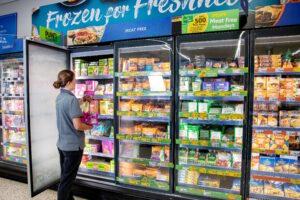Morrisons raises store freezer temperatures to limit carbon emissions
Morrisons has launched a new trial to increase the temperature of some supermarket freezers by 3°C in a bid to cut carbon emissions.

The move, which will not impact food safety, comes as the current -18°C guidance has not been updated since it was set out almost 100 years ago.
There are currently freezers in 10 stores across the UK involved in the trial which have been moved to -15°C, allowing the supermarket giant to assess the impact in different climates and supply conditions before a potential nationwide roll out.
Frozen food brand Birds Eye has supported the initiative, after an 18-month study by its owner Nomad Foods found that raising freezer temperatures -18°C to -15°C can reduce energy consumption by 10% to 11%, without affecting the safety, texture, taste, or nutritional value of food.
On a UK-wide level, a report from the Cop28 climate conference, authored by academics at the University of Birmingham and Heriot-Watt University, predicted that increasing freezer temperatures by just 3°C across global supply chains could save 8.6% of the energy used in the UK and cut carbon emissions equivalent to removing 3.8 million cars from the road.
Morrisons said the cost savings from the change could push prices down for shoppers and help it to achieve its goal of net zero carbon emissions from its own operations by 2035.
Grocery Gazette
Related news
Brits Embrace At‑Home Celebrations While Germans Cut Back on Valentine’s Day Spending
🎧 Hallgasd a cikket: Lejátszás Szünet Folytatás Leállítás Nyelv: Auto…
Read more >Iglo and Findus in new hands
🎧 Hallgasd a cikket: Lejátszás Szünet Folytatás Leállítás Nyelv: Auto…
Read more >Related news
How Coca-Cola plans to build more billion-dollar brands
🎧 Hallgasd a cikket: Lejátszás Szünet Folytatás Leállítás Nyelv: Auto…
Read more >Tesco sets out store expansion plans in 2026 including five former Amazon Fresh sites
🎧 Hallgasd a cikket: Lejátszás Szünet Folytatás Leállítás Nyelv: Auto…
Read more >Brits Embrace At‑Home Celebrations While Germans Cut Back on Valentine’s Day Spending
🎧 Hallgasd a cikket: Lejátszás Szünet Folytatás Leállítás Nyelv: Auto…
Read more >





